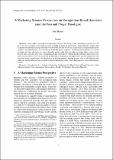A marketing science perspective on recognition-based heuristics (and the fast-and-frugal paradigm)
Author(s)
Hauser, John R.
DownloadHauser_ A Marketing Science.pdf (202.3Kb)
OPEN_ACCESS_POLICY
Open Access Policy
Creative Commons Attribution-Noncommercial-Share Alike
Terms of use
Metadata
Show full item recordAbstract
Marketing science seeks to prescribe better marketing strategies (advertising, product development, pricing, etc.). To do so we rely on models of consumer decisions grounded in empirical observations. Field experience suggests that recognition-based heuristics help consumers to choose which brands to consider and purchase in frequently-purchased categories, but other heuristics are more relevant in durable-goods categories. Screening with recognition is a rational screening rule when advertising is a signal of product quality, when observing other consumers makes it easy to learn decision rules, and when firms react to engineering-design constraints by offering brands such that a high-level on one product feature implies a low level on another product feature. Experience with applications and field experiments suggests four fruitful research topics: deciding how to decide (endogeneity), learning decision rules by self-reflection, risk reduction, and the difference between utility functions and decision rules. These challenges also pose methodological cautions.
Date issued
2011-07Department
Sloan School of ManagementJournal
Judgment and Decision Making
Publisher
Society for Judgment and Decision Making
Citation
Hauser, John. "A marketing science perspective on recognition-based heuristics (and the fast-and-frugal paradigm)." Judgment and Decision Making, Vol. 6, No. 5, July 2011, pp. 396–408.
Version: Author's final manuscript
ISSN
1930-2975